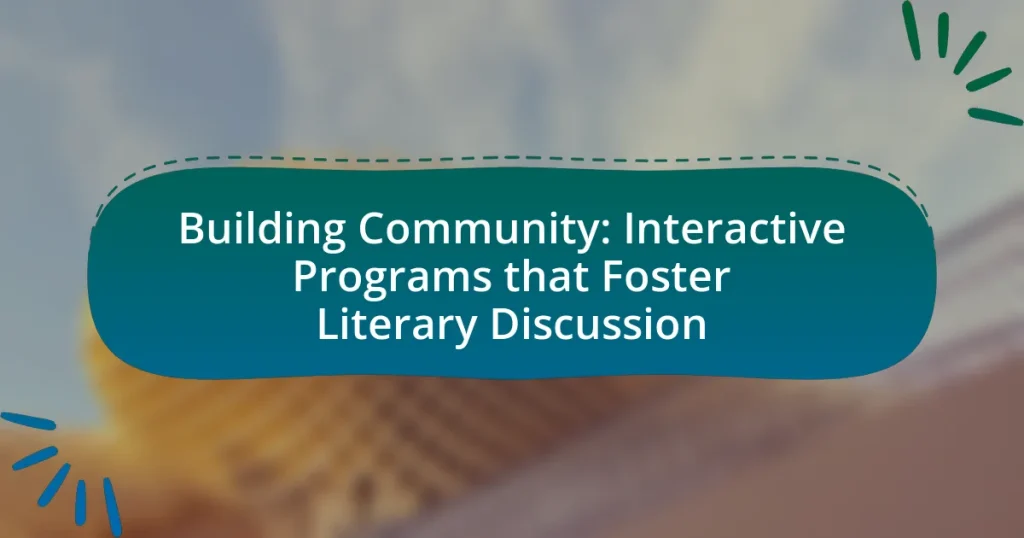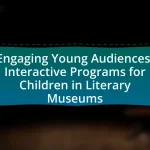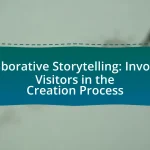The article focuses on interactive programs that foster literary discussion, such as book clubs, online forums, and literary festivals, highlighting their role in enhancing community engagement and critical thinking. It examines how these programs contribute to community building by creating spaces for meaningful dialogue and diverse perspectives. Key components for successful programs include engagement, accessibility, and skilled facilitators, while challenges such as participant engagement and technological limitations are also addressed. The article emphasizes the importance of literature in shaping community identity and offers practical strategies for sustaining interest and participation in literary discussions.
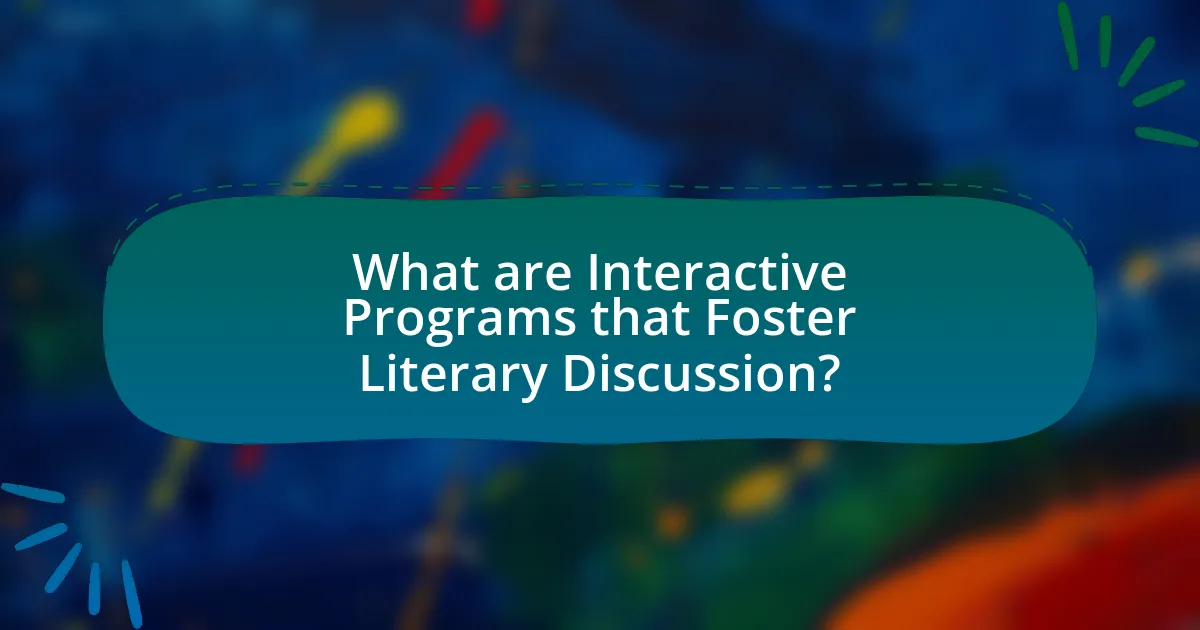
What are Interactive Programs that Foster Literary Discussion?
Interactive programs that foster literary discussion include book clubs, online forums, and literary festivals. These programs encourage participants to engage with texts collaboratively, share diverse perspectives, and deepen their understanding of literature. For instance, book clubs often utilize structured discussions and thematic explorations to enhance engagement, while online forums provide platforms for ongoing dialogue among readers across geographical boundaries. Literary festivals typically feature author panels and workshops that promote interaction between writers and audiences, facilitating a communal exploration of literary themes. Such programs have been shown to enhance critical thinking and community building, as evidenced by studies indicating that group discussions can lead to greater comprehension and appreciation of literary works.
How do these programs contribute to community building?
Interactive programs that foster literary discussion contribute to community building by creating spaces for individuals to engage in meaningful dialogue and share diverse perspectives. These programs encourage collaboration among participants, enhancing social bonds and fostering a sense of belonging. Research indicates that community engagement through literary discussions can lead to increased civic participation and improved social cohesion, as evidenced by studies showing that book clubs and literary events often result in stronger community ties and enhanced mutual understanding among residents.
What types of interactive programs are commonly used?
Commonly used interactive programs include book clubs, literary workshops, and online discussion forums. Book clubs facilitate group reading and discussion, allowing participants to share insights and perspectives on selected texts. Literary workshops provide hands-on experiences where participants can engage in writing exercises and receive feedback, fostering creativity and collaboration. Online discussion forums enable broader participation, allowing individuals to discuss literary works asynchronously, thus enhancing community engagement and dialogue. These programs are effective in promoting literary discussion and building a sense of community among participants.
How do these programs engage participants in literary discussions?
These programs engage participants in literary discussions by facilitating structured dialogues and interactive activities that encourage critical thinking and personal reflection on texts. For instance, book clubs often utilize guided questions to stimulate conversation, while workshops may incorporate role-playing or creative writing exercises that allow participants to explore themes and characters in depth. Research indicates that such interactive formats enhance comprehension and retention, as evidenced by a study published in the Journal of Educational Psychology, which found that collaborative discussions significantly improve participants’ analytical skills and engagement levels.
Why is fostering literary discussion important for communities?
Fostering literary discussion is important for communities because it enhances social cohesion and promotes critical thinking. Engaging in literary discussions allows individuals to share diverse perspectives, fostering empathy and understanding among community members. Research indicates that communities with active literary programs experience increased civic engagement and improved communication skills, which are essential for collaborative problem-solving. For example, a study by the National Endowment for the Arts found that reading and discussing literature can lead to higher levels of community involvement and a greater sense of belonging.
What role does literature play in community identity?
Literature plays a crucial role in shaping community identity by reflecting shared values, experiences, and cultural narratives. It serves as a medium through which communities express their unique stories and collective memories, fostering a sense of belonging among members. For instance, local literature often highlights regional history and traditions, reinforcing cultural pride and continuity. Studies have shown that communities engaged in literary discussions, such as book clubs or public readings, experience enhanced social cohesion and a stronger sense of identity, as these activities encourage dialogue and connection among diverse individuals.
How can literary discussions enhance social connections?
Literary discussions enhance social connections by fostering shared experiences and promoting empathy among participants. Engaging in conversations about literature allows individuals to explore diverse perspectives, which can lead to deeper understanding and stronger bonds. Research indicates that book clubs and literary circles create a sense of community, as participants often share personal insights and relate their own experiences to the themes discussed in the literature. This interaction not only strengthens existing relationships but also facilitates the formation of new friendships, as individuals connect over common interests and ideas.
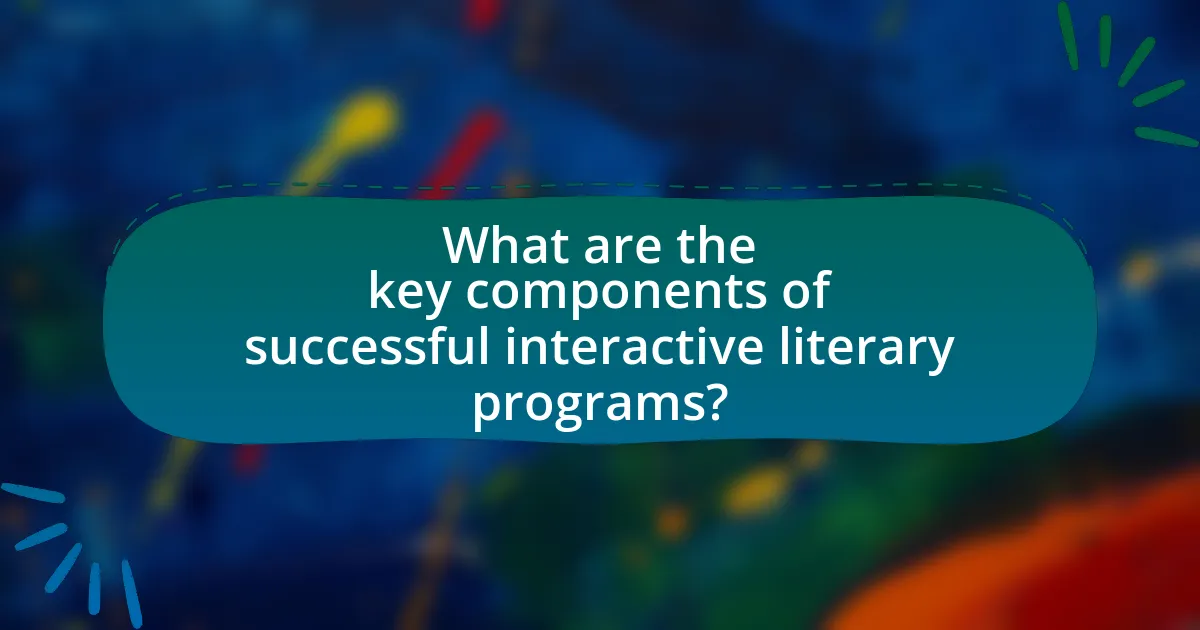
What are the key components of successful interactive literary programs?
Successful interactive literary programs incorporate engagement, accessibility, and community involvement as key components. Engagement is achieved through dynamic activities such as workshops, discussions, and readings that encourage participant interaction with texts and each other. Accessibility ensures that programs are open to diverse audiences, providing materials and formats that cater to various literacy levels and backgrounds. Community involvement fosters a sense of belonging and ownership, often through partnerships with local organizations, schools, and libraries, which enhances participation and investment in the program. These components collectively create an enriching environment that promotes literary discussion and community building.
How do facilitators influence the effectiveness of these programs?
Facilitators significantly influence the effectiveness of interactive programs that foster literary discussion by guiding conversations, creating a supportive environment, and encouraging participant engagement. Their expertise in managing group dynamics allows them to navigate diverse opinions and foster inclusivity, which enhances the overall experience for participants. Research indicates that skilled facilitators can increase participant satisfaction and retention rates, as they effectively stimulate critical thinking and deeper analysis of literary works. For instance, a study published in the Journal of Adult Education found that programs led by trained facilitators resulted in a 30% increase in participant engagement compared to those without facilitation. This demonstrates that the role of facilitators is crucial in maximizing the impact of literary discussion programs.
What skills should facilitators possess?
Facilitators should possess strong communication, active listening, and conflict resolution skills. Effective communication enables facilitators to convey ideas clearly and engage participants, while active listening ensures they understand diverse perspectives. Conflict resolution skills are essential for managing disagreements and fostering a collaborative environment. Research indicates that facilitators with these skills can significantly enhance group dynamics and participant satisfaction, as evidenced by studies showing improved outcomes in collaborative learning settings.
How can facilitators create an inclusive environment?
Facilitators can create an inclusive environment by actively promoting diverse perspectives and ensuring equitable participation among all participants. This can be achieved through strategies such as establishing ground rules that encourage respect and openness, using inclusive language, and providing multiple ways for individuals to engage, such as through discussions, written reflections, or small group activities. Research indicates that inclusive practices lead to higher engagement and satisfaction among participants, as evidenced by a study published in the Journal of Educational Psychology, which found that inclusive environments significantly enhance learning outcomes and foster a sense of belonging among diverse groups.
What resources are essential for implementing these programs?
Essential resources for implementing interactive programs that foster literary discussion include trained facilitators, suitable venues, and access to diverse literary materials. Trained facilitators are crucial as they guide discussions, ensuring engagement and inclusivity among participants. Suitable venues, such as community centers or libraries, provide a welcoming environment conducive to open dialogue. Access to diverse literary materials, including books, articles, and multimedia resources, enriches discussions and caters to varied interests. These resources collectively enhance the effectiveness and reach of literary programs, fostering a vibrant community of readers and thinkers.
What types of literature should be included in discussions?
Discussions should include a diverse range of literature, such as classic novels, contemporary fiction, poetry, non-fiction works, and graphic novels. Classic novels provide historical context and thematic depth, while contemporary fiction reflects current societal issues and trends. Poetry offers unique perspectives and emotional resonance, and non-fiction works can stimulate critical thinking and informed debate. Graphic novels combine visual storytelling with narrative complexity, appealing to varied audiences. Including these types of literature fosters a richer dialogue and enhances community engagement in literary discussions.
How can technology enhance interactive literary programs?
Technology can enhance interactive literary programs by facilitating real-time communication and collaboration among participants. For instance, platforms like Zoom and Discord enable live discussions, allowing readers to share insights and interpretations instantly. Additionally, tools such as social media and dedicated apps can create virtual book clubs, where users can post comments, share resources, and engage in discussions asynchronously. Research indicates that digital platforms increase engagement; a study by the Pew Research Center found that 73% of teens use social media to discuss books and authors, demonstrating the effectiveness of technology in fostering literary dialogue.
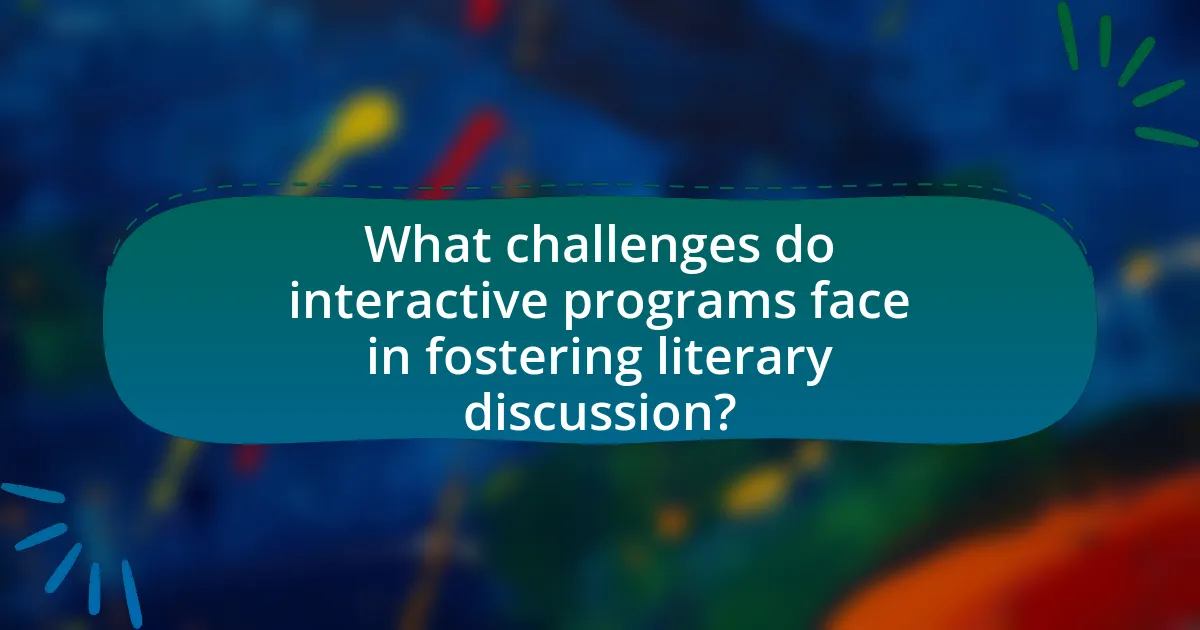
What challenges do interactive programs face in fostering literary discussion?
Interactive programs face several challenges in fostering literary discussion, primarily including participant engagement, diverse perspectives, and technological limitations. Engaging participants can be difficult as individuals may have varying levels of interest or familiarity with the literary material, which can hinder meaningful dialogue. Additionally, fostering diverse perspectives is challenging because participants may come from different backgrounds and have differing interpretations, leading to potential conflicts or misunderstandings. Technological limitations can also impede discussions, as issues such as connectivity problems or platform usability can disrupt the flow of conversation and discourage participation. These challenges highlight the complexities involved in creating an effective interactive environment for literary discussion.
How can programs overcome participation barriers?
Programs can overcome participation barriers by implementing inclusive outreach strategies and providing accessible resources. For instance, targeted marketing efforts can engage underrepresented communities, ensuring that information about programs reaches diverse audiences. Additionally, offering materials in multiple languages and formats can accommodate varying literacy levels and learning styles. Research indicates that programs that incorporate flexible scheduling and virtual participation options see increased attendance, as they cater to different schedules and preferences. By addressing logistical challenges and fostering an inclusive environment, programs can significantly enhance participation rates.
What strategies can be employed to attract diverse participants?
To attract diverse participants, organizations can implement targeted outreach strategies that focus on inclusivity and representation. These strategies include collaborating with community organizations that serve underrepresented groups, utilizing social media platforms to reach a broader audience, and offering programs in multiple languages to accommodate non-native speakers. Research indicates that inclusive programming increases participation rates; for instance, a study by the National Endowment for the Arts found that diverse outreach efforts can enhance engagement by up to 30%. Additionally, creating a welcoming environment through culturally relevant content and diverse facilitators can further encourage participation from varied demographics.
How can programs address varying levels of literary knowledge?
Programs can address varying levels of literary knowledge by implementing differentiated instruction strategies that cater to diverse learning needs. These strategies include offering tiered reading materials that match participants’ proficiency levels, facilitating small group discussions that allow for peer learning, and providing targeted workshops that focus on specific literary concepts. Research indicates that differentiated instruction can enhance engagement and comprehension, as evidenced by a study published in the Journal of Educational Psychology, which found that students exposed to tailored learning experiences demonstrated improved literary analysis skills.
What are the best practices for sustaining engagement in literary discussions?
The best practices for sustaining engagement in literary discussions include fostering an inclusive environment, encouraging diverse perspectives, and utilizing interactive formats. Creating an inclusive environment ensures that all participants feel valued and heard, which can be achieved through active listening and respectful dialogue. Encouraging diverse perspectives enriches the discussion by introducing various interpretations and insights, thereby enhancing critical thinking. Utilizing interactive formats, such as group activities or multimedia resources, keeps participants actively involved and invested in the conversation. Research indicates that discussions that incorporate these elements lead to higher levels of participant satisfaction and retention, as evidenced by studies on group dynamics and engagement in educational settings.
How can feedback be utilized to improve future programs?
Feedback can be utilized to improve future programs by systematically collecting and analyzing participant responses to identify strengths and weaknesses. This process allows program organizers to make data-driven decisions that enhance engagement and effectiveness. For instance, a study by the National Endowment for the Arts found that programs incorporating participant feedback saw a 30% increase in satisfaction ratings, demonstrating the tangible benefits of responsive adjustments. By implementing changes based on specific feedback, such as adjusting content or format, future programs can better meet the needs and preferences of the community, ultimately fostering a more vibrant literary discussion environment.
What role do follow-up activities play in maintaining interest?
Follow-up activities play a crucial role in maintaining interest by reinforcing engagement and fostering ongoing connections among participants. These activities, such as discussions, feedback sessions, or additional reading materials, help to deepen understanding and sustain enthusiasm for the subject matter. Research indicates that consistent interaction post-event increases retention rates and encourages participants to remain involved, as evidenced by a study published in the Journal of Educational Psychology, which found that follow-up communications can enhance participant satisfaction and commitment by up to 30%.
What practical tips can enhance the effectiveness of interactive literary programs?
To enhance the effectiveness of interactive literary programs, facilitators should prioritize participant engagement through structured discussions and diverse activities. Engaging participants actively fosters a sense of community and encourages deeper literary exploration. For instance, incorporating small group discussions allows individuals to share perspectives, while activities like role-playing or creative writing prompts can stimulate creativity and critical thinking. Research indicates that programs utilizing interactive methods see increased participant satisfaction and retention rates, as evidenced by a study from the National Endowment for the Arts, which found that interactive literary events significantly boost audience involvement and enjoyment.
